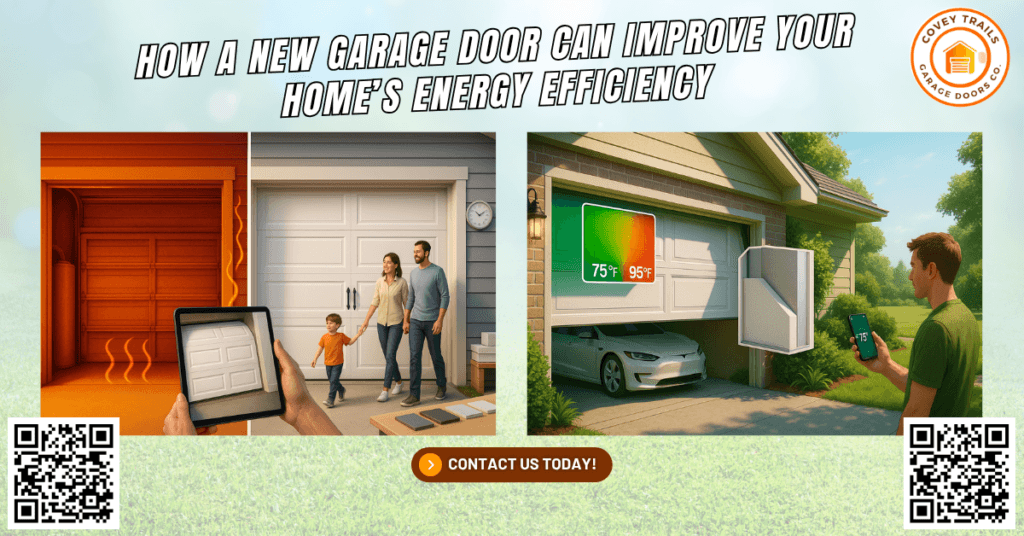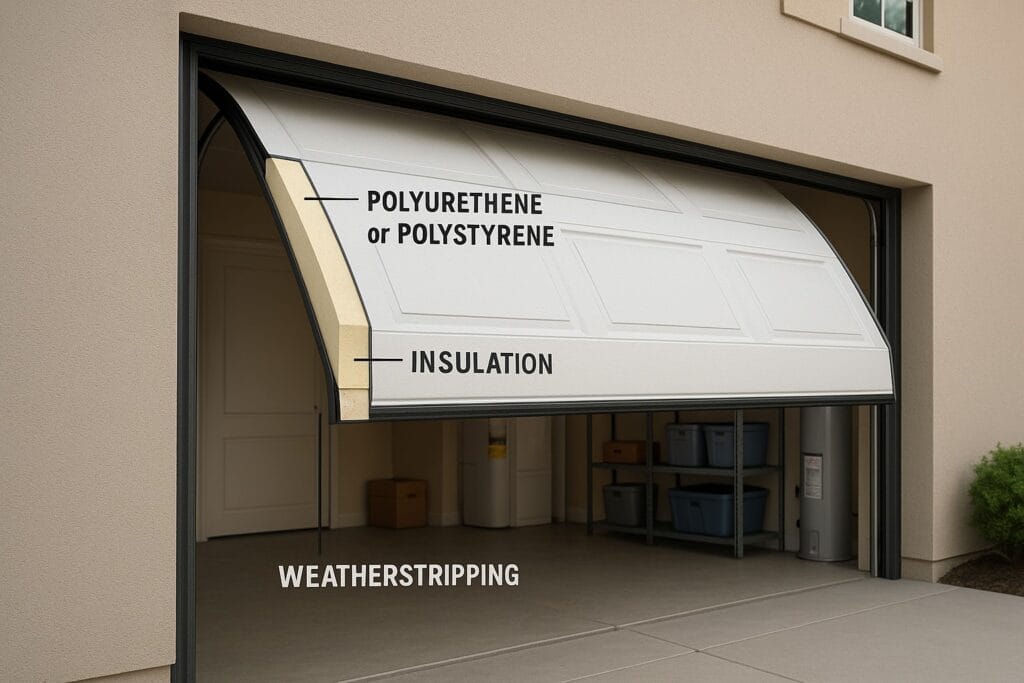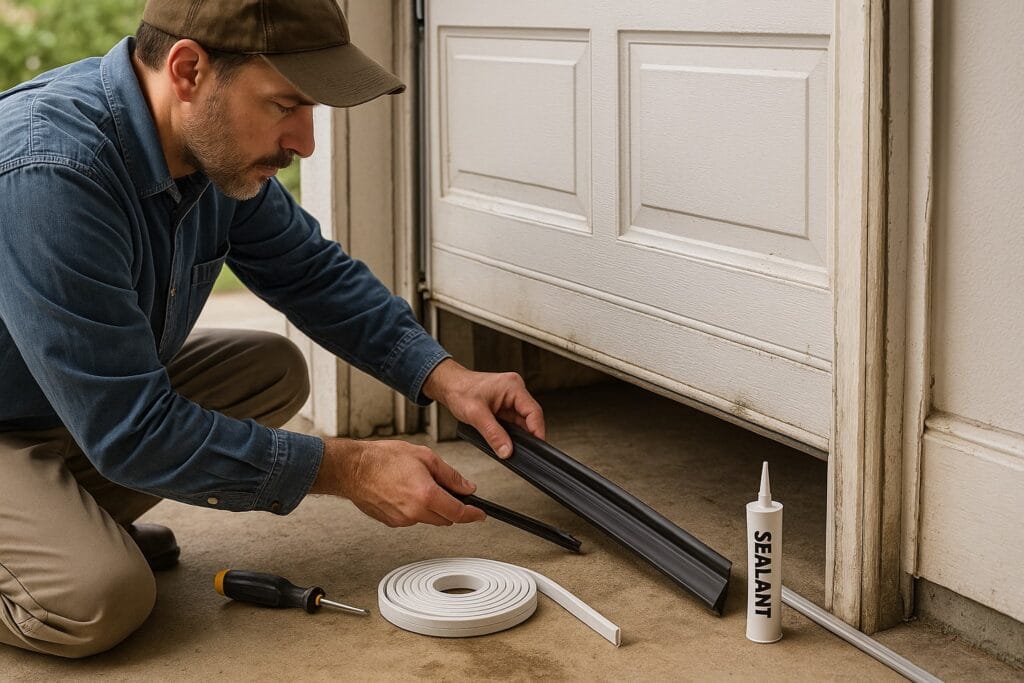How a New Garage Door Can Improve Your Home’s Energy Efficiency

In Richmond, TX, a homeowner named David O’Mara recently reached out to us at Covey Trails Garage Doors Co. after noticing his energy bills had been climbing steadily each month. After inspecting his aging wood garage door, we discovered significant wear: warped panels, delaminated sections, deteriorated weatherstripping, and compromised garage door springs. The door’s insulation was outdated and thin, letting outdoor air pour into his garage and adjacent rooms. We recommended a custom garage door replacement using a polyurethane-insulated steel door with smart technology features like remote monitoring, security camera integration, and a belt-drive garage door opener. Within the first month after installation, David reported that his utility costs had dropped by nearly 20%, and his garage had become a much more comfortable space for hobbies, storage, and everyday entry.
That homeowner’s experience is not unique. According to the U.S. Department of Energy, uninsulated or poorly sealed garage doors contribute significantly to household energy loss, especially in homes with attached garages. With Texas temperatures known to soar in the summer and dip during cold weather months, this inefficiency can strain your HVAC system, spike your energy bills, and make your home uncomfortable. The garage door, often overlooked as a major access point, plays a critical role in controlling temperature and energy costs. A high-quality garage door with smart features, updated insulation, and professional installation can mitigate this issue effectively, especially when installed by a certified technician familiar with garage door styles, opener models, and insulation systems.
Upgrading to a new garage door is one of the smartest energy efficiency improvements you can make for your home. It’s more than a cosmetic facelift; it’s an investment in comfort, sustainability, security, and long-term cost savings. It enhances curb appeal, boosts resale value, helps regulate internal temperatures, and improves security by incorporating features like automatic locks, safety sensors, and integration with security cameras. A new door can also address common issues such as faulty springs, misaligned tracks, or outdated openers. In this comprehensive guide, we’ll explain how a new garage door can enhance energy performance, discuss garage door installation costs and options, and share why Richmond, TX, homeowners should consider this valuable upgrade today.
Why Energy Efficiency Matters for Your Home
Energy efficiency is essential for homeowners seeking to reduce utility bills and improve comfort. A well-insulated and properly installed garage door minimizes heat exchange between your garage and the outside environment. This is especially important in Richmond, TX, where homes face intense heat in the summer and occasional cold spells in the winter. A garage that allows air to seep in or out can cause your heating and cooling systems to work overtime, raising your energy consumption and costs.
Modern garage doors help prevent energy loss by forming a barrier that insulates and seals your home. When paired with energy-efficient windows, weatherstripping, and high-performance garage door openers, your home becomes better equipped to handle temperature fluctuations. Upgrading your garage door is a key step in building a more energy-resilient home.
The Role of Your Garage Door in Home Insulation
Garage doors play a significant role in maintaining a home’s energy envelope. Since garages are often connected to the main structure of the house, any energy loss through this space affects overall temperature regulation. Poorly insulated garage doors create hot zones in summer and cold zones in winter, which bleed into surrounding rooms and make them less comfortable.

A new insulated garage door, especially one with polyurethane or polystyrene core materials, acts as a thermal barrier. This helps maintain a more stable environment inside the garage, protecting HVAC systems, stored belongings, and living areas above or adjacent to the garage. The inclusion of weatherstripping, bottom seals, and perimeter seals further improves energy efficiency by blocking drafts and moisture.
Understanding R-Value and Its Importance
R-value is a measure of thermal resistance used in the building and garage door industries to rate the effectiveness of insulation. The higher the R-value, the better the door resists the transfer of heat. For garage doors in Richmond, TX, we recommend choosing doors with R-values ranging from R-12 to R-18, depending on whether the garage is climate-controlled or attached to the living space.
Materials like polyurethane offer some of the highest R-values and are ideal for maximizing insulation. High R-value garage doors not only improve energy efficiency but also reduce noise pollution and enhance overall comfort. Investing in a door with a suitable R-value ensures a long-term return on investment in both utility savings and home durability.
Benefits of Installing a New Garage Door for Energy Efficiency
Lower Utility Bills
A well-insulated new garage door can significantly cut down on energy waste. With less air escaping or infiltrating the home, heating and cooling systems don’t have to work as hard. Over time, this translates to reduced monthly electricity bills. Homeowners have reported savings of 10-20% on average by upgrading their garage door, especially when paired with other energy-efficient upgrades.
Improved Comfort
Whether your garage is used for storage, as a home gym, workshop, or laundry area, temperature control is crucial. A new garage door ensures the interior is less affected by outdoor weather, making the space more comfortable year-round. This also benefits adjacent rooms, which can maintain a more stable indoor climate.
Extended HVAC Lifespan
Reducing the workload of your HVAC system helps extend its operational life. A new garage door that provides better insulation and reduces temperature swings allows your heating and cooling units to run more efficiently and last longer. This can save you on future repair and replacement costs and reduce maintenance frequency.
Environmental Impact
Energy-efficient garage doors are not only good for your home, but they are also better for the environment. By using less energy to maintain comfortable temperatures, you decrease your household’s carbon footprint. Modern doors made from recyclable or sustainable materials also add to your eco-friendly choices.
Enhanced Curb Appeal and Resale Value
Garage doors can occupy up to 30% of your home’s exterior. Upgrading to a stylish and energy-efficient model enhances the appearance of your property. A new door increases curb appeal and can raise the resale value of your home, especially when prospective buyers are looking for energy-saving features.
What to Look for in an Energy-Efficient Garage Door
Choosing the right garage door involves several factors that contribute to energy efficiency and performance. First, consider the insulation type. Polyurethane offers superior insulation and rigidity, while polystyrene is a more budget-friendly alternative. Double- or triple-layer construction is another essential feature, providing durability and thermal protection.
Additionally, look for doors with thermal breaks, which reduce the transfer of heat between inner and outer surfaces. Quality weather seals around the perimeter, bottom edge, and between door sections prevent air and moisture intrusion. Opt for professional installation to ensure the door is level, sealed, and aligned for maximum energy performance.
Ideal Materials for Energy-Efficient Garage Doors
Material choice plays a critical role in garage door performance. Steel doors are among the most popular choices due to their strength, insulation capability, and wide range of design options. They are available in several finishes and can be customized to replicate wood grain aesthetics. Composite and fiberglass doors offer rust resistance and insulation, but may not be as strong as steel.
Wood garage doors provide natural beauty and unique craftsmanship, but they often require more maintenance and may have lower R-values. Vinyl and aluminum doors are lightweight and corrosion-resistant, but typically offer lower insulation performance unless enhanced with internal insulation. Your selection should balance durability, aesthetics, and energy efficiency for the best result.
Maintenance Tips to Preserve Energy Efficiency
To maintain the energy efficiency of your garage door, routine maintenance is essential. Inspect weatherstripping annually and replace it if it’s cracked or missing. Check for drafts and gaps, especially around the door edges and bottom seal. Lubricate springs, rollers, and hinges to ensure smooth, quiet operation.

It’s also a good idea to have your door and opener system professionally serviced at least once a year. Technicians can identify worn parts, inspect the insulation integrity, and ensure all components are functioning correctly. Staying proactive with garage door maintenance prevents small issues from becoming expensive problems down the line.
Common Signs You Need a New Garage Door
Recognizing when it’s time for a replacement is crucial. Signs include rising energy bills, drafts near the garage, difficulty opening or closing the door, noisy operation, and visible wear like sagging or warping. If your door lacks modern safety features, insulation, or smart technology, upgrading could significantly improve your home’s performance.
Older garage doors with failing garage door openers, broken springs, or outdated materials are less secure and energy-efficient. In many cases, replacement is more cost-effective than frequent repairs. A new door brings enhanced security, modern design, and better functionality to your garage.
Local Considerations: Richmond, TX Climate
The climate in Richmond, TX, presents unique challenges for homeowners. Hot, humid summers and cool winters require homes to have strong insulation systems. Garage doors are often exposed to direct sunlight, which can warp panels and increase internal garage temperatures. A quality garage door helps regulate these extremes.
Choosing an energy-efficient model that withstands UV exposure and moisture is critical for this region. Steel and composite doors with high R-values and rust-resistant coatings perform well in Richmond’s climate. At Covey Trails Garage Doors Co., we understand these conditions and help homeowners choose the most suitable options for their homes.
Final Thoughts
Upgrading your garage door isn’t just about aesthetics; it’s a smart move that can enhance comfort, reduce energy bills, and improve home security. For homeowners in Richmond, TX, and surrounding areas, energy-efficient garage doors offer both immediate and long-term returns. Modern options go beyond insulation, incorporating advanced safety features, smart openers, and customizable designs to match your home and budget.
Materials like steel, wood, aluminum, fiberglass, and composites offer various benefits in durability, insulation, and maintenance. Pairing the right material with smart technology, such as Wi-Fi-compatible openers and automatic closure systems, boosts both convenience and energy savings.
If you’re dealing with a drafty or outdated door, now is the time to consider an upgrade. Look for high R-values, reliable sealing, and professional installation to ensure optimal performance. Choosing the right garage door not only adds curb appeal but also delivers functional value tailored to Richmond’s climate and your household needs.
Contact us today and let us show you how a professionally installed, energy-efficient garage door can make all the difference.
How Can Covey Trails Garage Doors Co. Help You?
At Covey Trails Garage Doors Co., we provide not just products but complete solutions tailored to improve your lifestyle and energy efficiency. If you’re unsure where to start, our team offers:
- Expert consultations to assess your specific needs
- Free estimates for new installations or upgrades
- Detailed garage door guides to help you compare trusted brands like Wayne Dalton, Overhead Door, and more
- Professional installation ensuring proper sealing and long-term performance
- Reliable repair services and annual maintenance plans
- Energy efficiency inspections to enhance long-term savings
Now is the time to act. Let a new garage door help reduce energy consumption, increase safety, and add lasting value to your home. Investing in the right door is a decision that will benefit you for years to come, enhancing not only your home’s energy performance but also its appearance, security, and convenience.
📍 Visit Us:
Covey Trails Garage Doors Co.,
1646 Blaisdale Rd, Richmond, TX 77406
📞 Call Us: (713) 401-9063
📅 Schedule a Consultation Today! Click HERE.
Frequently Asked Questions (FAQs)
1. How long does it take to install a new garage door?
Most standard garage door installations take between 4 to 6 hours, but custom designs or complex opener systems may require a full day.
2. Can I insulate my current garage door instead of replacing it?
Yes, insulation kits are available, but they may not offer the same performance, fit, or R-value as a professionally installed insulated garage door.
3. What is the average lifespan of an energy-efficient garage door?
With proper maintenance, a high-quality insulated garage door can last 15 to 30 years, depending on the material and usage.
4. Are energy-efficient garage doors eligible for any rebates or tax credits?
In some cases, yes, local utilities or government programs may offer incentives, so check with your provider or installer for current eligibility.
